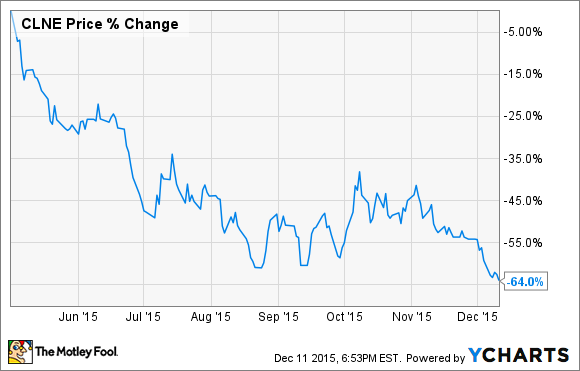Clean Energy Fuels Corp. (CLNE 2.57%), the largest supplier of natural gas for transportation in North America, has seen its stock fall 38% since the start of November. If we go back to the beginning of May, when the company's stock reached its high point for the year, shares are down nearly two-thirds:
And while there are certainly risks the company continues to face, the market's fear of all things oil and gas may have created an opportunity for investors willing to stomach a little more risk. Let's take a closer look.
What the risks look like
Clean Energy Fuels isn't profitable, having invested big bucks -- by taking on big debt -- to build out a network of over-the-road natural gas refueling stations for heavy trucking over the past few years. A number of issues have led to a slow payoff on this expansion, including delays in natural gas engines for heavy-duty trucks, diesel prices falling sharply over the past year, cutting into the financial benefit of natural gas, and the slow-to-change nature of the trucking industry, with its razor-thin margins and heavy competition.
Furthermore, there's short-term fears at work, too. The company has $150 million in long-term debt due in mid-2016. Management issued a release in November, disclosing that it would sell $75 million in new shares to help pay that debt. This is a necessary step to help it get to cash flow positive, but at recent prices, that's about 21% dilution. Ideally, management will hold out for higher prices before selling shares to limit that dilution.
Also, the company only has $165 million in cash on hand, and that amount is likely to be reduced as each quarter passes. Add in the huge decline in oil prices recently, and there you have it: That's why the stock has fallen so much in the past.
What the market may have missed
There is good news. To start, business isn't going to dry up overnight for Clean Energy Fuels. Unlike equipment makers such as Power Solutions International Inc. (PSIX 0.04%), which is dealing with flat sales after rapid growth over the past half-decade.
Power Solutions International makes engines in nearly every imaginable size for a variety of on- and off-road applications, which can run on a variety of diesel and gasoline alternatives, including natural gas. In the third quarter, Power Solutions reported sales growth of 19%, which sounds strong on the surface. But when you back out the $18.9 million in sales tied to two large acquisitions earlier in 2015, sales actually declined about 1% over the past year.
This isn't a knock against Power Solutions, but a reminder that equipment makers are much more subject to the whims of short-term demand and cyclical changes.
Besides, engine maker Cummins (CMI 0.30%) joint partnership with Westport Innovations, Cummins Westport, has had a solid year. Through the first nine months of 2015, revenue increased 8%, and that accelerated to 17% in the third quarter. So far this year, Cummins Westport has sold 6% more natural gas engines than last year.
This matters for two reasons:
First, an engine maker like Cummins of Power Solutions only gets the original sale, and maybe some parts and maintenance revenue over time. Clean Energy, however, will generate recurring revenue until the vehicle is taken out of operation years later. In other words, the huge decline in oil prices may reduce the number of natural gas vehicles sold, but it won't take those in operation off the road.
Second, the size of the addressable market is simply huge, and small industrial adoption still moves the needle for Clean Energy. So far this year, Cummins Westport has sold more than 7,500 natural gas engines, with the vast majority of those replacing diesel. 7,500 new medium- and heavy-duty natural gas vehicles will consume 70-80 million gallons of fuel per year. That's nearly 25% of Clean Energy's current annual total fuel sales.
In other words, there's still growth opportunity, even in a weak demand environment.
Lastly, the price advantage of natural gas may have weakened some, but it's far from gone:
Henry Hub Natural Gas Spot Price data by YCharts.
On Dec. 14, the wholesale price for natural gas fell below $1.88, the cheapest it's been in 13 years. Natural gas is still cheaper than diesel, and by more than a lot of people realize.
Looking ahead
There's no arguing that Clean Energy Fuels faces a challenging environment, and there's risk to consider. However, the market's recent treatment of the stock -- lumping it in with all things energy -- ignores the steady improvements in the business itself over the past year, as well as the fundamental nature of the way its core business works. The risk of losses isn't lower because the stock price has fallen, but the risks are no higher today than they were a month or two ago, either.
If you're willing to take on those risks, there's a lot of upside.






